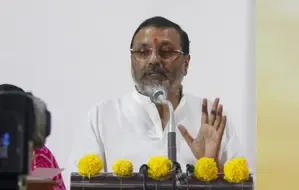Did BJP MP Uncover Nehru’s 1963 Letter to Challenge Rahul Gandhi’s ‘Surrender’ Comment on PM Modi?

Synopsis
Key Takeaways
- BJP MP Nishikant Dubey highlighted a 1963 letter from Nehru to counter Rahul Gandhi’s comments.
- The letter reflects India's historical territorial losses to China post-1962 war.
- Rahul Gandhi accused PM Modi of compromising India’s interests under foreign influence.
- BJP spokesperson Sudhanshu Trivedi criticized Congress's historical stance on national security.
- The political exchange highlights ongoing tensions between the BJP and Congress.
New Delhi, June 4 (NationPress) The BJP has taken a proactive stance against Congress leader Rahul Gandhi following his remarks regarding Prime Minister Narendra Modi. BJP MP Nishikant Dubey unearthed a historical letter penned by former Prime Minister Jawaharlal Nehru to launch a counteroffensive against Rahul Gandhi and the Congress party.
In a direct attack on Rahul Gandhi, Dubey shared on social media: “Do you understand what surrender truly looks like, Rahul Baba? This is surrender. This letter from January 1963 was written by your esteemed grandfather, Jawaharlal Nehru, after India suffered defeat in the 1962 war with China.”
He presented excerpts from Nehru's correspondence with the Chinese Premier, which he argued conveyed a tone of submission.
As per Dubey, the letter mentioned that China had seized 20,000 sq km of Indian territory in the east and 6,000 sq km in the west, along with taking 4,000 Indian soldiers prisoner.
Dubey also contended that Nehru dispatched the Sri Lankan Prime Minister as a “mediator for surrender” and was “awaiting instructions from China.”
The letter, dated January 1, 1963, states in part: “This new proposal is more unfavorable than your three-point proposal, as it seeks to exclude the Indian armed forces from the entire area of Indian territory subjected to this latest aggression since September 8, 1962 -- that is, from over 20,000 square kilometers in the Eastern sector and over 6,000 square kilometers in the Western sector... Surely, the officials of both sides can hardly discuss and reach agreements on such matters as withdrawal arrangements... if they lack clear directives from their Governments regarding the line concerning which the disengagement of armed forces... is to be arranged.”
This debate ignited after Rahul Gandhi criticized PM Modi on Tuesday.
Gandhi stated, “When Trump called, Modi surrendered without hesitation.” He accused the Prime Minister of endangering India's interests under foreign pressure.
Furthermore, Rahul claimed that the BJP and RSS have a prolonged history of capitulation, in stark contrast to Congress’s legacy of standing firm on national issues.
He referenced the 1971 war under then Prime Minister Indira Gandhi, when India resisted US pressure and achieved a significant victory that resulted in the formation of Bangladesh.
In reaction to Rahul Gandhi’s remarks about PM Modi, BJP national spokesperson Sudhanshu Trivedi previously accused the Congress party of a long-standing tradition of surrendering, which he suggested Gandhi is now attempting to distract from with unfounded statements.
“If you want to comprehend what genuine surrender is, remember Rahul Gandhi -- just two years ago, you traveled abroad and stated: 'Why are the defenders of democracy, America and Europe, silent and not interfering in India?' That was surrender,” Trivedi remarked.
He provided several examples, accusing former Congress administrations of undermining India’s strategic standing.









